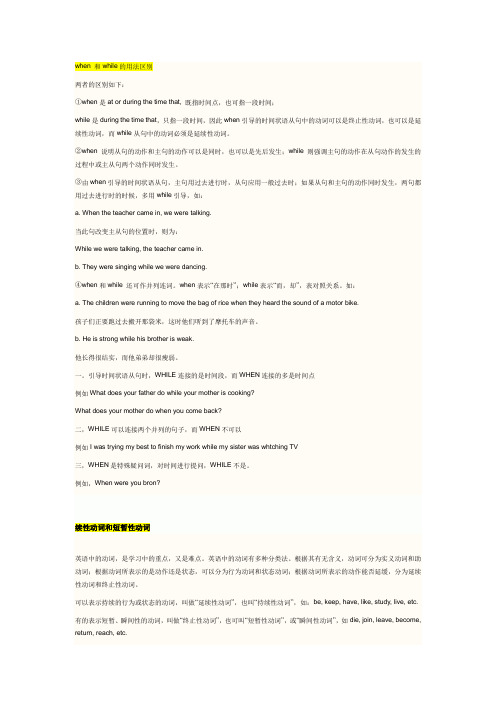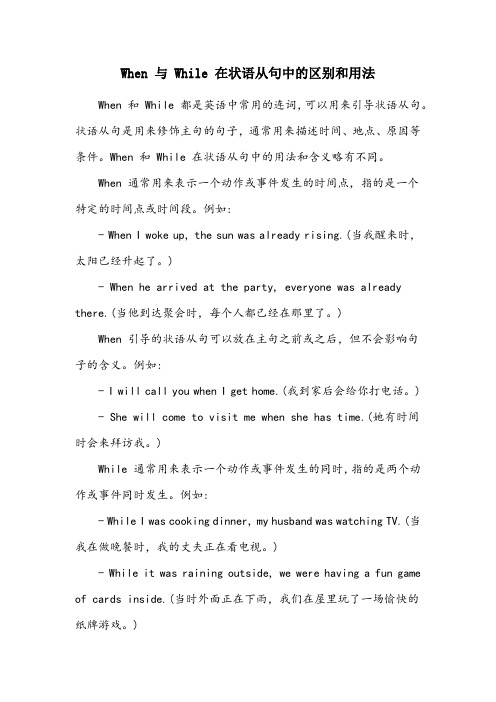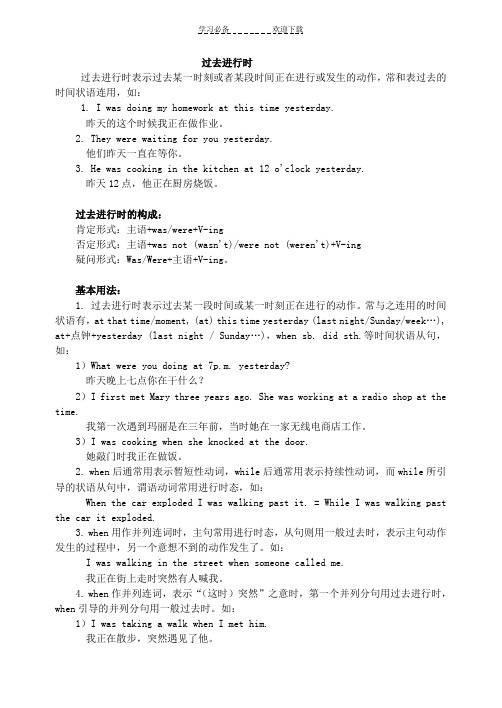while和when引导的时间状语从句主句用一般时
when 和while的用法区别

when 和while的用法区别两者的区别如下:①when是at or during the time that, 既指时间点,也可指一段时间;while是during the time that,只指一段时间,因此when引导的时间状语从句中的动词可以是终止性动词,也可以是延续性动词,而while从句中的动词必须是延续性动词。
②when 说明从句的动作和主句的动作可以是同时,也可以是先后发生;while 则强调主句的动作在从句动作的发生的过程中或主从句两个动作同时发生。
③由when引导的时间状语从句,主句用过去进行时,从句应用一般过去时;如果从句和主句的动作同时发生,两句都用过去进行时的时候,多用while引导,如:a. When the teacher came in, we were talking.当此句改变主从句的位置时,则为:While we were talking, the teacher came in.b. They were singing while we were dancing.④when和while 还可作并列连词。
when表示“在那时”;while表示“而,却”,表对照关系。
如:a. The children were running to move the bag of rice when they heard the sound of a motor bike.孩子们正要跑过去搬开那袋米,这时他们听到了摩托车的声音。
b. He is strong while his brother is weak.他长得很结实,而他弟弟却很瘦弱。
一。
引导时间状语从句时,WHILE连接的是时间段,而WHEN连接的多是时间点例如What does your father do while your mother is cooking?What does your mother do when you come back?二,WHILE可以连接两个并列的句子,而WHEN不可以例如I was trying my best to finish my work while my sister was whtching TV三,WHEN是特殊疑问词,对时间进行提问,WHILE不是。
when和while的用法区别

when 和whi le的用法区别两者的区别如下:①when是at or d uring th e time t hat, 既指时间点,也可指一段时间;whi le是durin g the ti me that,只指一段时间,因此when引导的时间状语从句中的动词可以是终止性动词,也可以是延续性动词,而wh ile从句中的动词必须是延续性动词。
②whe n 说明从句的动作和主句的动作可以是同时,也可以是先后发生;wh ile 则强调主句的动作在从句动作的发生的过程中或主从句两个动作同时发生。
③由when引导的时间状语从句,主句用过去进行时,从句应用一般过去时;如果从句和主句的动作同时发生,两句都用过去进行时的时候,多用while引导,如:a.When the teacher came in, we wer e talkin g.当此句改变主从句的位置时,则为:W hile w ew ere tal king, th e teache r came i n.b.They wer e singin g w hilewe weredancing.④when和while 还可作并列连词。
w hen表示“在那时”;while表示“而,却”,表对照关系。
如:a. The childre n were r unning t o move t he bag o f rice w hen they heard t he sound of a mo tor bike.孩子们正要跑过去搬开那袋米,这时他们听到了摩托车的声音。
b. Heis stron g whilehis brot her is w eak.他长得很结实,而他弟弟却很瘦弱。
while和when引导的时间状语从句主句用一般时备课讲稿

while和when引导的时间状语从句,主句用(一般过去时)从句用(过去进行).while引导的从句要加延续性动词,而when 延续和短暂性动词都可以,。
6. 另外,when和while的区别还在于:while引导的时间状语从句多用过去进行时态,而when引导的时间状语从句多用一般过去时态。
While they were talking , the bell rang.正在他们谈话的时候,上课铃响了。
I was doing my homework when my mother came back home yesterday evening.昨天晚上妈妈回家的时候,我正在做家庭作业。
我在做饭的时候简正在练习。
当此句改变主从句的位置时,则用when引导。
老师进来时(这一时刻),他们在擦地板。
他们正擦地板时(这段时间),老师进来了。
2. when 说明从句的动作和主句的动作可以是同时,也可以是先后发生;while 则强调主句的动作在从句动作的发生的过程中或主从句1.While we____(wait)for the bus,a girl__________(run)up tous.2.I__________(telephone)a friend whenBob__________(come)in.6.While mother______(put)Cathy to bed,the doorbell_______(ring).7.when I________(walk)in the park,it__________(begin) to rain.9.George____(read)when they______(hear)a knock at the door.1.I_____(have)my breakfast t at half past six yesterday morning.3.What_____you___(do)at that time? We_____(watch)TV.6.____they___(have)a meeting at 4 yesterdayafternoon?No,they_____.They_____(clean)the classroom.13.When the bell rang,jenny_____(wait )in her seat.14.She_____(make)her dress the whole afternoon.1 .I ______ a meal when you _____ me.a. cooked, were ringingb. was cooking, rangc. was cooking, were ringingd. cooked, rang2.He said he _____ to draw a plane on the blackboard at that time.a. triesb. triedc. was tryingd. will try3.While she ______ TV, she ______ a sound outside the room.a. was watching, was hearingb. watched, was hearingc. watched, heardd. was watching, heard4.They _____ a football game from 7 to 9 last night.a. were watchingb. watchc. watchedd. are watching10.He ____ his father on the farm the whole afternoon last Saturday.a. helpsb. would helpc. was helpingd. is helping11.While mother _______ some washing, I _____ a kite for Kate.a. did, madeb. was doing, madec. was doing, wasmaking d. did, was making13.He ____ some cooking at that time, so he _____ mea. did, heardb. did, didn't hearc. was doing, heardd. was doing, didn't hear14.This time yesterday jack _____ his bike. He _____ TVa. repaired, didn't watchb. was repairing, watchedc. repaired, watchedd. was repairing, wasn't watching。
when和while引导的时间状语从句与这一时态连用

when和while引导的时间状语从句与这一时态连用;所以区别when和while的用法成了这一单元的难点;一、when,while都有“当……时候”的意思;when既可表示某一点时间,也可以表示某一段时间;在when引导的时间状语从句中,其谓语动词可以是延续性的,也可以是非延续性的,可与主句中的谓语动词同时发生,也可在其后发生;例如:1、I was just reading a book when she came into my room.她走进我房间时,我正在看书;2、Were you writing when the teacher came in老师进来的时候,你在写信吗3、When he was a child he was always trying out new ideas.他小时候就常常试验一些新的设想;二、while只能表示某一段时间,不能表示某一点时间;在while引导的时间状语从句中,其谓语动词只能是延续性的,而且也只能与主句中的谓语动词同时发生或存在;例如:1、While Jim was mending his bike, Lin Tao came to see him.正当吉姆修自行车时,林涛来看他;2、You can’t do your homework while you’re watching TV.你不能一边看电视一边做家庭作业;三、另外,when和while的区别还在于:while引导的时间状语从句多用进行时态,而when引导的时间状语从句多用一般时态;例如:1、While they were talking , the bell rang.正在他们谈话的时候,上课铃响了;2、I was doing my homework when my mother came back home yesterday evening.昨天晚上妈妈回家的时候,我正在做家庭作1. ----------she comes , I shall tell her to wait for you.A. WhenB. AsC. WhileD. What2. ----------she got older, she got wiser.A. WhenB. AsC. WhileD. Thatwas reading , his wife was cooking.A. WhenB. AsC. WhileD. Thatwhen as while①when 表示较短的时间,有的时候也可以指一段时间;如:When he was young, he could do eat much more than his brother.②while常表示一段较长的时间,强调主句谓语动词与从句谓语动词同时发生;如:你的第三道题就是这样;③只用as, 不用when或while的时候;A 用于表示同一个人的两种动作交替进行,指"一边……,一边……";如:The girl dances as she sings on the stage.B表示两个同步发展的动作或行为,译为"随着……";如:As time went on, she became more and more worried.when和while的区别都表示“当......时候”的区别;请观察以下句子:While in Vienna he studied music.他在维也纳时学习音乐;While he was eating, I asked him to lend me $2.当他正在吃饭时,我请他借给我二英镑;While two detectives were keeping guard at the door, two others opened the parcel. 这时两个侦探把着门,另外两个打开包裹;While I read, she sang.我看书时,她在唱歌;I met her while I was at school.当我在学校的时候我遇见了她;Edison was not a good student when he was a young boy.爱迪生小时候不是一个成绩好的学生;When the plane arrived, some of the detectives were waiting inside the main building while others were waiting on the airfield.当飞机抵达时,一部分侦探等在主楼里面,而另一部分则等在停机坪上;When I came home my wife was cooking dinner.我回家时,妻子在做晚饭;通过观察,我们可以这样理解:when引导的从句里动作发生的时间相对主句动作发生的时间要短些;while引导的从句里的动作发生的时间相对主句而言更长些;333 as,when,while意为although尽管,but但是,seeing that鉴于A 只有在形容词+as+主语+to be/to seem/to appear这一结构中,as 才意为though/although尽管:Tired as he was he offered to carry her.相当于:Though he was tired he offered to carry her.尽管他很累了,他还主动提出要背着她;Strong as he was,he couldn’t lift it.尽管他力气很大,他仍提不起这个东西;B while可意为but,用于表示强调对比:‘At sea’means‘on a ship’,while‘at the sea’means‘at the seaside’.“At sea”意为“在船上”,而“at the sea”意为“在海滩上”;Some people waste food while others haven’t enough.一些人糟踏食物而另一些人却食不果腹;while可以意为although,这时常放在句首:While I sympathize with your point of view I cannot accept it.尽管我认同你的观点,但我不能接受它;C when可以意为seeing that/although鉴于;因此它同while 很相似,但主要用于引导使另一个动作显得不合理的陈述句;它常用在一个问句里,但不是一定如此:How can you expect your children to be truthful when you yourself tell lies你自己都在撒谎,怎么能指望你的孩子们诚实It’s not fair to expect her to do all the cooking when she has had no training or experience.她没有受过烹调方面的训练,也没有这方面的经验,让她把做饭的事全部承担下来是不公平的;D 请务必不要搞混when与if的用法;When he comes等他来了意为我们肯定他会来的;If he comes如果他来了意为我们不能肯定他是否会来。
when和while的用法和区别

when和while的用法和区别while和when都是表示同时,到底句子中是用when还是while主要看从句和主句中所使用的动词是短暂性动作(瞬时动词)还是持续性动作。
1、若主句表示的是一个短暂性的动作,而从句表示的是一个持续性动作时,两者都可用。
如:He fell asleep when [while] he was reading. 他看书时睡着了。
?I met him when [while] I was taking a walk in the park. 我在公园散步时遇到了他。
?2、若主、从句表示两个同时进行的持续性动作,且强调主句表示的动作延续到从句所指的整个时间,通常要用while。
如:Don’t talk while you’re eating. 吃饭时不要说话。
?I kept silent while he was writing. 在他写的时候,我默不作声。
?3、若从句是一个短暂性动作,而主句是一个持续性动作,可以when 但不用while。
如:When he came in, I was listening to the radio. 他进来时,我在听收音机。
?It was raining hard when we arrived. 我们到达时正下着大雨。
?4、若主、从句表示的是两个同时(或几乎同时)发生的短暂性动作,一般要用when。
如:I thought of it just when you opened your mouth. 就在你要说的时候,我也想到了。
至于什么是短暂性动作,什么是持续性动作,其实有个很简单的规律。
就是如果是进行时态,一般是持续性的。
如果是过去式,一般是短暂性动作。
对于,填写when还是while的问题,通常首先看主句和从句中的时态,再根据以上4个规律来判断填写那个单词。
When和While的区别通常when 后面接一般过去时while 后面接过去进行时①when是at or during the time that, 既指时间点,也可指一段时间,while是during the time that,只指一段时间,因此when引导的时间状语从句中的动词可以是终止性动词,也可以是延续性动词,而while从句中的动词必须是延续性动词。
when引导的从句和主句用什么时态

when引导的从句和主句用什么时态
时间状语从句中,如果主句是现在的时态(现在进行时、现在完成时或一般现在时),从句可以用任意时态;如果主句是过去的时态(一般过去时、过去完成时、过去进行时、过去将来时),从句时态也必须用过去的时态(过去进行时、过去完成时、一般过去时、过去将来时)。
when,while,as都可以引导时间状语从句,但用法区别非常大,具体而言:
一、when可以和延续性动词连用,也可以和短暂性动词连用;而while和as只能和延续性动词连用。
①Why do you want a new job when you’ve got such a good one already?(get为短暂性动词)你已经找到如此好的工作,为何还想再找新的?
②Sorry,I was out when you called me.(call为短暂性动词)
对不起,你打电话时我刚好外出了。
③Strike while the iron is hot.(is为延续性动词,表示一种持续的状态)趁热打铁。
④The students took notes as they listened.(listen为延续性动词)学生们边听课边做笔记。
二、when从句的谓语动词可以在主句谓语动作之前、之后或同时发生;while和as从句的谓语动作必须是和主句谓语动作同时发生。
1.从句动作在主句动作前发生,只用 when。
①When he had finished his homework,he took a short rest.(finished先发生)
当他完成作业后,他休息了一会儿。
初中英语:对比when与while引导的时间状语从句

她总会寻求我的帮助。
He was fond of swimming when (he was) yet a child. 他还是孩子时,就喜欢
游泳。
He cut himself while (he was) shaving. 他在刮胡子时刮伤了自己。
4.在when和while引导的时间状语从句中,当主句和从句的主语不一致,但
是属于泛指意义的代词you时,从句中的主语和be动词也可省略。
例如:When (you are) in Rome, do as the Romans do. 入乡随俗。
A good way to master English is to spend holidays in English speaking coun-tries, and while (you are) there, talk to native speakers. 掌握英语的一个好方法是
在说英语的国家度假,当你在那里时,与英语母语人士多交谈。
5.在when和while引导的时间状语从句中,当从句和主句的主语不一致,但
是从句主语和主句中的宾语一致时,从句中的主语和be动词也可省略。
例如:He told me to remain silent when (I was) not asked. 当(我)没有被问到时,
他告诉我保持沉默。
She told her son not to talk while (he was) eating. 她告诉她儿子在(他)吃饭
时不要说话。
7。
while引导的时间状语从句例句

while引导的时间状语从句的用法和例句一、while引导的时间状语从句的时态while引导的时间状语从句通常表示主句的动作和从句的动作同时发生,因此从句的谓语动词一般是延续性的,即可以持续一段时间的动词。
根据主句的时态,从句的时态有以下几种情况:如果主句是一般过去时,从句用过去进行时,表示过去某个时刻或某段时间内同时进行的两个动作。
例如:He fell asleep while he was watching TV. 他看电视的时候睡着了。
She learned a lot while she was working in the library. 她在图书馆工作的时候学到了很多。
如果主句是一般现在时,从句用现在进行时,表示现在某个时刻或某段时间内同时进行的两个动作。
例如:He listens to music while he is doing his homework. 他做作业的时候听音乐。
She often talks on the phone while she is driving. 她开车的时候经常打电话。
如果主句是一般将来时,从句用将来进行时,表示将来某个时刻或某段时间内同时进行的两个动作。
例如:He will call you while he is traveling. 他旅行的时候会给你打电话。
She will study hard while she is preparing for the exam. 她准备考试的时候会努力学习。
如果主句是过去完成时,从句用过去完成进行时,表示过去某个时间点之前一直同时进行的两个动作。
例如:He had already finished his report when I arrived, while he had been working on it for two hours. 我到达的时候,他已经完成了他的报告,而他已经在做了两个小时了。
when和while的区别

3、When he had finished his homework,he took a short rest. 当他完成作业后,他休息了一会儿。
while
while只能表示某一时间段,不能表示某一时 间点。在while引导的时间状语从句中,其谓 语动词只能是延续性的,而且也只能与主 句中的谓语动词同时发生或存在。
通常要用while
• 例句:
Don’t talk while you’re eating. 吃饭时不要说话。
I kept silent while he was writing. 在他写信的时候,我默不作声。
3.若从句是一个短暂性动作,而主句是一个持续性 动作,可以用when 但不用while
• 例句: When he came in, I was listening to the radio. 他进来时,我在听收音机。 It was raining hard when we arrived. 我们到达时正下着大雨。
例句
• 1、While Jim was mending his bike, Tom came to see him. 正当吉姆修自行车时,汤姆来看他。 2、You can’t do your homework while you’re watching TV. 你不能一边看电视一边做家庭作业。 3、While she was listening the music,she slept. 她听着音乐睡着了。
A.when B.while
C.until
D.before
2. I will go to see you when you _____ the training course. A. finished B. finish C. are finishing D. will finish
when与while的在状语从句区别和用法

When 与 While 在状语从句中的区别和用法When 和 While 都是英语中常用的连词,可以用来引导状语从句。
状语从句是用来修饰主句的句子,通常用来描述时间、地点、原因等条件。
When 和 While 在状语从句中的用法和含义略有不同。
When 通常用来表示一个动作或事件发生的时间点,指的是一个特定的时间点或时间段。
例如:- When I woke up, the sun was already rising.(当我醒来时,太阳已经升起了。
)- When he arrived at the party, everyone was already there.(当他到达聚会时,每个人都已经在那里了。
)When 引导的状语从句可以放在主句之前或之后,但不会影响句子的含义。
例如:- I will call you when I get home.(我到家后会给你打电话。
) - She will come to visit me when she has time.(她有时间时会来拜访我。
)While 通常用来表示一个动作或事件发生的同时,指的是两个动作或事件同时发生。
例如:- While I was cooking dinner, my husband was watching TV.(当我在做晚餐时,我的丈夫正在看电视。
)- While it was raining outside, we were having a fun game of cards inside.(当时外面正在下雨,我们在屋里玩了一场愉快的纸牌游戏。
)While 引导的状语从句通常放在主句之前,但有时候也可以放在主句之后。
例如:- I was watching TV while my husband was cooking dinner.(当我正在看电视时,我的丈夫正在做晚餐。
)- We were having a fun game of cards while it was raining outside.(当时外面正在下雨,我们正在玩纸牌游戏。
when和while引导的时间状语从句与这一时态连用

when和while引导的时间状语从句与这一时态连用。
所以区别when和while的用法成了这一单元的难点。
(一)、when,while都有“当……时候”的意思。
when 既可表示某一点时间,也可以表示某一段时间。
在when引导的时间状语从句中,其谓语动词可以是延续性的,也可以是非延续性的,可与主句中的谓语动词同时发生,也可在其后发生。
例如:1、I was just reading a book when she came into my room. 她走进我房间时,我正在看书。
2、Were you writing when the teacher came in? 老师进来的时候,你在写信吗?3、When he was a child he was always trying out new ideas. 他小时候就常常试验一些新的设想。
(二)、while只能表示某一段时间,不能表示某一点时间。
在while引导的时间状语从句中,其谓语动词只能是延续性的,而且也只能与主句中的谓语动词同时发生或存在。
例如:1、While Jim was mending his bike, Lin Tao came to see him. 正当吉姆修自行车时,林涛来看他。
2、You can’t do your homework while you’re watching TV. 你不能一边看电视一边做家庭作业。
(三)、另外,when和while的区别还在于:while引导的时间状语从句多用进行时态,而when引导的时间状语从句多用一般时态。
例如:1、While they were talking , the bell rang. 正在他们谈话的时候,上课铃响了。
2、I was doing my homework when my mother came back home yesterday evening. 昨天晚上妈妈回家的时候,我正在做家庭作when和while引导的时间状语从句与这一时态连用。
小议when与while引导的时间状语从句

小议when与while引导的时间状语从句摘要:时间状语从句是初中英语学习的重点,也是必考点,而when与while引导的时间状语从句是八年级学生学习的重难点,本文从状语从句的含义入手,通过简单、通俗、易懂的实例,从三个方面对when与while引导的时间状语从句作了区分和比较。
关键词:时间状语从句比较区别由一个主句和一个或一个以上的表示从属关系的主谓结构构成的句子叫复合句,在复合句中修饰主句中的动词、形容词和副词等的从句叫做状语从句。
状语从句有时也用来修饰整个句子,在整个复合句中起状语作用。
其中when和while 引导的从句叫做时间状语从句。
从句既可位于主句之前,也可位于主句之后。
位于主句之前时,一般要用逗号与主句隔开。
eg.My family left Lanzhou when I was ten years old.=When I was ten yeas old,my family left Lanzhou.当我10岁的时候,全家离开了兰州。
状语从句对初二学生来说,是平时学习的难点,也是重点,更是中考必考内容之一。
笔者结合自己的教学实践,从三个方面对when与while引导的时间状语从句加以分析,希望在平时能引起注意。
一、when引导的时间状语从句1.通常情况下,主从句的时态一般是一致的,都用(一般)过去时态Mozart started writing music when he was four.莫扎特在4岁时,就开始作曲了。
2.当主从句两动作均未发生时,主句用一般将来时态或用祈使句,从句则用一般现在时代替一般将来时I’ll tell him about that when I see him.当我见到他时,会把这件事告诉他的。
“Tell him about the news when he comes,Tom.”“Yes,I will.”Tom,当他回来时告诉他这个消息。
是的,我将(会)。
过去进行时when和while引导时间状语从句的区别

过去进行时过去进行时表示过去某一时刻或者某段时间正在进行或发生的动作,常和表过去的时间状语连用,如:1. I was doing my homework at this time yesterday.昨天的这个时候我正在做作业。
2. They were waiting for you yesterday.他们昨天一直在等你。
3. He was cooking in the kitchen at 12 o'clock yesterday.昨天12点,他正在厨房烧饭。
过去进行时的构成:肯定形式:主语+was/were+V-ing否定形式:主语+was not (wasn't)/were not (weren't)+V-ing疑问形式:Was/Were+主语+V-ing。
基本用法:1. 过去进行时表示过去某一段时间或某一时刻正在进行的动作。
常与之连用的时间状语有,at that time/moment, (at) this time yesterday (last night/Sunday/week…), at+点钟+yesterday (last night / Sunday…),when sb. did sth.等时间状语从句,如:1)What were you doing at 7p.m. yesterday?昨天晚上七点你在干什么?2)I first met Mary three years ago. She was working at a radio shop at the time.我第一次遇到玛丽是在三年前,当时她在一家无线电商店工作。
3)I was cooking when she knocked at the door.她敲门时我正在做饭。
2. when后通常用表示暂短性动词,while后通常用表示持续性动词,而while所引导的状语从句中,谓语动词常用进行时态,如:When the car exploded I was walking past it. = While I was walking past the car it exploded.3. when用作并列连词时,主句常用进行时态,从句则用一般过去时,表示主句动作发生的过程中,另一个意想不到的动作发生了。
when和while

when和while引导的时间状语从句与这一时态连用。
所以区别when和while的用法成了这一单元的难点。
(一)、when,while都有“当……时候”的意思。
when既可表示某一点时间,也可以表示某一段时间。
在when引导的时间状语从句中,其谓语动词可以是延续性的,也可以是非延续性的,可与主句中的谓语动词同时发生,也可在其后发生。
例如:1、I was just reading a book when she came into my room. 她走进我房间时,我正在看书。
2、Were you writing when the teacher came in? 老师进来的时候,你在写信吗?3、When he was a child he was always trying out new ideas. 他小时候就常常试验一些新的设想。
(二)、while只能表示某一段时间,不能表示某一点时间。
在while引导的时间状语从句中,其谓语动词只能是延续性的,而且也只能与主句中的谓语动词同时发生或存在。
例如:1、While Jim was mending his bike, Lin Tao came to see him. 正当吉姆修自行车时,林涛来看他。
2、You can’t do your homework while you’re watching TV. 你不能一边看电视一边做家庭作业。
(三)、另外,when和while的区别还在于:while引导的时间状语从句多用进行时态,而when引导的时间状语从句多用一般时态。
例如:1、While they were talking , the bell rang. 正在他们谈话的时候,上课铃响了。
2、I was doing my homework when my mother came back home yesterday evening. 昨天晚上妈妈回家的时候,我正在做家庭作1.when既指时间点,也可指一段时间2.while只指一段时间,因此when引导的时间状语从句中的动词可以是终止性动词,也可以是延续性动词,而while从句中的动词必须是延续性动词。
when,while和as引导时间状语从句的用法

when,while和as引导时间状语从句的⽤法when, while 和 as 引导时间状语从句的⽤法这三个词的意思很简单,都有“当……时候”的意思。
但学⽣经常会问三个词的区别在哪⼉,特别是在做选择题的时候。
别说是学⽣,就我个⼈⽽⾔,做这样的选择题要保证百分之百的正确也是不可能的。
现根据⼤量的实例和个⼈的思考,做⼀点⼩结,供⼤家参考。
⼀、when 的⽤法如果只从现象来看,when 从句⽤的最多的是⼀般过去时,⽽主句的时态没有限制,根据具体情况⽽定。
When he was a child he was always trying out new ideas.他⼩时候就常常试验⼀些新的设想。
when she came into my room I was just reading a book.她⾛进我房间时,我正在看书。
Were you writing when the teacher came in?⽼师进来的时候,你在写信吗?Sorry,I was out when you called me.对不起,你打电话来的时候我出去了。
He was on the point of leaving when someone knocked at the door.他正要⾛,这时有⼈敲门。
I thought of it just when you opened your mouth.就在你要说话的时候,我也想到了。
I had hardly[scarcely] closed my eyes when someone knocked at the door.我刚⼀闭上眼,就有⼈在敲门了。
根据以上的例句,我们可以总结出⼀点:when 从句的A事件,相当于另⼀个事件B发⽣的时间点。
也就是说,when 从句的重点不在动作本⾝发⽣的状态,⽽只是把它作为⼀个时间点,所以when 多数情况下⽤的是⼀般过去时,则不⽤正在进⾏时。
高三复习-while引导的时间状语从句主句用什么时态

while引导的时间状语从句主句用什么时态当while表示同时的时候,主句和从句的时态是一致的,既可以都是一般现在时,又可以都是一般过去时。
可以表示过去同时发生或者现在正在同时发生某事。
while做名词1、After lunch, she likes to take a nap for a while.她喜欢午饭后眯一会儿。
2、It takes a while to adapt to a new environment.适应新环境需要花一段时间。
while做连词 1. 引导时间状语,解释为“当...的时候”。
(1)We must strike while the iron is hot.趁热打铁。
(我们必须当铁热的时候去击打它。
)(2)While he is speaking, he does a lot of gestures.他演讲的时候有很多手势。
2. 引导让步状语从句,意思是“虽然…但是…”。
这种情况,while 多放于句首(1)While there was no conclusive evidence, most people thought he was guilty.虽然没有确凿的证据,大多数人还是认为他有罪。
(2)While my heart is willing, my flesh is weak.心有余而力不足。
(虽然我的心是愿意的,但是我的肉体是虚弱的)。
3. 引导条件状语,意思是“只要”.(1)While there is life there is hope.留得青山在,不怕没柴烧。
(只要有命在,就有希望。
)(2)While there is a will, there is a way.有志者事竟成。
(只要有意志力,就有道路。
)。
when和while用法比较

when和while用法比较When所引导的从句谓语动词可以是延续性动词,也可以是非延续性动词;从句的时态多用一般现在时或一般过去时。
例句:The train had left when I got to the station.例句:I met one of my old friends when I was walking in the street yesterday.而while引导的主从复合句则通常都为延续性的动词,因而常常使用进行时态。
例句:My mother was cooking while my father was watching TV.例句:One boy is rowing while the other boy in the boat is dangling around his legs in the cool water of the lake.一个男孩正在划船,而船里的另一个男孩则把腿悬垂在凉爽的湖水中。
2、when 可以用于be about to do sth. when ...的固定结构当中例句:I was just about to call you when you called me.例句:When I arrived home, my mother was cooking.当我到家进,妈妈正在做饭。
例句:I get the giggles when I'm nervous.我紧张时就不停地咯咯大笑。
While所引导的从句谓语必须是延续性动词;从句一般要用进行时态,如果主句和从句的动作时同时进行的,则主句也应为进行时态。
例句3:The telephone rang while I was watching TV.当我在天电视时,电话铃响了。
例句4:I was writing a letter while my father was reading a newspaper.我爸爸在看报纸时,我正在写信。
while和when引导的时间状语从句主句用一般时

w h i l e和w h e n引导的时间状语从句主句用一般时Company Document number:WTUT-WT88Y-W8BBGB-BWYTT-19998while和when引导的时间状语从句,主句用(一般过去时)从句用(过去进行).while引导的从句要加延续性动词,而when 延续和短暂性动词都可以,。
6. 另外,when和while的区别还在于:while引导的时间状语从句多用过去进行时态,而when引导的时间状语从句多用一般过去时态。
While they were talking , the bell rang.正在他们谈话的时候,上课铃响了。
I was doing my homework when my mother came back home yesterday evening.昨天晚上妈妈回家的时候,我正在做家庭作业。
我在做饭的时候简正在练习。
当此句改变主从句的位置时,则用when引导。
1.While we____(wait)for the bus,a girl__________(run)up to us.2.(telephone)a friend when Bob__________(come)in.3. mother______(put)Cathy to bed,the door bell_______(ring).4. I________(walk)in the park,it__________(begin) to rain.5.(read)when they______(hear)a knock at the door.6.(have)my breakfast t at half past six yesterday morning.7.(do)at that time We_____(watch)TV.8.(have)a meeting at 4 yesterday afternoonNo,(clean)the classroom.9. the bell rang,jenny_____(wait )in her seat.10.(make)her dress the whole afternoon.1 .I ______ a meal when you _____ me.a. cooked, were ringingb. was cooking, rangc. was cooking, were ringingd. cooked, rangsaid he _____ to draw a plane on the blackboard at that time.a. triesb. triedc. was tryingd. will tryshe ______ TV, she ______ a sound outside the room.a. was watching, was hearingb. watched, was hearingc. watched, heardd. was watching, heard_____ a football game from 7 to 9 last night.a. were watchingb. watchc. watchedd. are watching____ his father on the farm the whole afternoon last Saturday.a. helpsb. would helpc. was helpingd. is helpingmother _______ some washing, I _____ a kite for Kate.a. did, madeb. was doing, madec. was doing, was makingd. did, was making____ some cooking at that time, so he _____ mea. did, heardb. did, didn't hearc. was doing, heardd. was doing, didn't heartime yesterday jack _____ his bike. He _____ TVa. repaired, didn't watchb. was repairing, watchedc. repaired, watchedd. was repairing, wasn't watching。
- 1、下载文档前请自行甄别文档内容的完整性,平台不提供额外的编辑、内容补充、找答案等附加服务。
- 2、"仅部分预览"的文档,不可在线预览部分如存在完整性等问题,可反馈申请退款(可完整预览的文档不适用该条件!)。
- 3、如文档侵犯您的权益,请联系客服反馈,我们会尽快为您处理(人工客服工作时间:9:00-18:30)。
while和when引导的时间状语从句,主句用(一般过去时)从句用(过去进行).while引导的从句要加延续性动词,而when 延续和短暂性动词都可以,。
6. 另外,when和while的区别还在于:while引导的时间状语从句多用过去进行时态,而when引导的时间状语从句多用一般过去时态。
While they were talking , the bell rang.
正在他们谈话的时候,上课铃响了。
I was doing my homework when my mother came back home yesterday evening.
昨天晚上妈妈回家的时候,我正在做家庭作业。
我在做饭的时候简正在练习。
当此句改变主从句的位置时,则用when引导。
老师进来时(这一时刻),他们在擦地板。
他们正擦地板时(这段时间),老师进来了。
2. when 说明从句的动作和主句的动作可以是同时,也可以是先后发生;while 则强调主句的动作在从句动作的发生的过程中或主从句
1.While we____(wait)for the bus,a girl__________(run)up to us.
2.I__________(telephone)a friend when
Bob__________(come)in.
6.While mother______(put)Cathy to bed,the door
bell_______(ring).
7.when I________(walk)in the park,it__________(begin) to rain.
9.George____(read)when they______(hear)a knock at the door.
1.I_____(have)my breakfast t at half past six yesterday morning.
3.What_____you___(do)at that time? We_____(watch)TV.
6.____they___(have)a meeting at 4 yesterday
afternoon?No,they_____.They_____(clean)the classroom.
13.When the bell rang,jenny_____(wait )in her seat.
14.She_____(make)her dress the whole afternoon.
1 .I ______ a meal when you _____ me.
a. cooked, were ringing
b. was cooking, rang
c. was cooking, were ringing
d. cooked, rang
2.He said he _____ to draw a plane on the blackboard at that time.
a. tries
b. tried
c. was trying
d. will try
3.While she ______ TV, she ______ a sound outside the room.
a. was watching, was hearing
b. watched, was hearing
c. watched, heard
d. was watching, heard
4.They _____ a football game from 7 to 9 last night.
a. were watching
b. watch
c. watched
d. are watching
10.He ____ his father on the farm the whole afternoon last Saturday.
a. helps
b. would help
c. was helping
d. is helping
11.While mother _______ some washing, I _____ a kite for Kate.
a. did, made
b. was doing, made
c. was doing, was
making d. did, was making
13.He ____ some cooking at that time, so he _____ me
a. did, heard
b. did, didn't hear
c. was doing, heard
d. was doing, didn't hear
14.This time yesterday jack _____ his bike. He _____ TV
a. repaired, didn't watch
b. was repairing, watched
c. repaired, watched
d. was repairing, wasn't watching。
